Teenage stars power India to first team title
Friday, August 18, 2023 - 20:18 By Vinay Siwach

AMMAN, Jordan (August 18) -- Last year, ANTIM (IND) gave India its first gold in women's wrestling at U20 World Championships. A year later, it's apt that the history maker played a key role in another Indian first -- this time a maiden team title at a World Championships.
With seven medals in 10 weight classes, India won the team title with 140 points, beating powerhouse Japan which finished with 129 points and the United States which had 118 points at the U20 World Championships in Amman, Jordan.
Antim, a name that translates into final or last, defended her gold medal from Sofia in another dominating performance at 53kg. She was joined by SAVITA (IND) who won the gold at 62kg, Antim KUNDU (IND) won silver at 65kg and two bronze medalists Reena SANGWAN (IND) at 57kg and Harshita MOR (IND) at 72kg. Priya MALIK (IND) had won gold at 76kg and Arju LUHACH (IND) a bronze medal at 68kg on Thursday.
Indian women had won 13 medals in all U20 World Championships till 2019. But in the three editions since, including the current one in Amman, India has accumulated 19 medals including four gold medals.
The first of those four came in Sofia last year when Antim, a relatively unknown teenager on the circuit demolished the field to win the gold at 53kg. Coming into Amman as defending champion, Antim not only wanted to defend her gold, she wanted to prove a point.
"Despite the gold last year, many people had doubts if I would be able to do it again. So I wanted to repeat in style," Antim said.
Antim, a name her parents gave symbolizing the desire not to have any more girl children, came to Amman after a tough mental battle, fighting for her selection for the upcoming Asian Games and unwanted media attention.
But putting all that aside, Antim reached the 53kg final in Amman with a fall and two technical superiority wins on Thursday. Making the final from the other side of the bracket was Mariia YEFREMOVA (UKR) who secured three pins in three bouts.
 Mariia YEFREMOVA (UKR) blocks an ANTIM (IND) attack during their 53kg final in Amman. (Photo: UWW / Amirreza Aliasgari)
Mariia YEFREMOVA (UKR) blocks an ANTIM (IND) attack during their 53kg final in Amman. (Photo: UWW / Amirreza Aliasgari)
As the 17-year-old steps on the mat, her short stature and childlike face may deceive her opponents. But a look at her resume only leaves them stunned or pinned. Before Friday, Yefremova was unbeaten in 31 bouts in eight tournaments and was going for the 32nd in the final and third age-group world title after two U17 titles.
The final in Amman began with Yefremova pacing her legs in the typical Japanese style adopted by many other countries. She tried gripping Antim's left hand and hoping to catch her left leg and get a cradle. Antim continuously snaps her down and builds forward pressure. Yefremova is quick to react and throws her legs backward every time Antim shoots.
Yefremova tries the left-hand grip again. In all three of her pins on Thursday, she used that grip to cradle her opponents and secure the fall. Antim, however, has already read that.
Forty seconds into the final, Antim shoots a double but Yefremova throws her legs back but Antim puts pressure on her head and gets the ankle, pulling Yefremova forward and scoring the takedown. As both wrestlers came to neutral, Antim went a little defensive. Yefremova got on a single-leg but Antim defended with a split before stepping over.
In the second period, Antim allowed Yefremova to catch her left biceps but caught her other hand so Yefremova cannot shoot for Antim's left leg for the cradle. Antim was warned once for passivity. With a minute left in the bout, Yefremova searched for options but looks out of sorts. A desperate low single from Yefremova was presumed by Antim who hit a counter and scored a takedown with 15 seconds on the clock.
Antim would celebrate with folded hands and a meek smile, not making a big deal of the feat she just achieved.
"I checked her bouts and she uses her grip on the left hand and throws the cradle," she said. "She did grip my left hand but I was aware of the move. Also, in the final, I wanted to keep myself away from injury. Every competition is important but there are senior-level competitions coming up so I needed to be safe."
The senior competitions for Antim include Asian Games in October and possibly World Championships in Belgrade. Less than a week from now, she will appear for a selection trial in India to book a ticket for her first World Championships.
For the Asian Games, two-time world bronze medalist Vinesh PHOGAT (IND) was India's direct entry but she injured her knee. Antim, who won a selection trial in which Phogat did not participate, replaced Phogat in the 53kg weight class. That also brought added responsibility for Antim.
"When I reached Amman, I had only one goal that I have to win gold again," she said. "I wanted to perform better than last year. The next day I came to know that I will be going to the Asian Games. So I felt that if I perform well in Amman, everyone will think that I am capable."
 ANTIM (IND) wrestles Mariia YEFREMOVA (UKR) in the 53kg final. (Photo: UWW / Kostadin Andonov)
ANTIM (IND) wrestles Mariia YEFREMOVA (UKR) in the 53kg final. (Photo: UWW / Kostadin Andonov)
Antim has been touted as Phogat's successor at 53kg as she ran her close at a domestic trial, losing 3-3. A month later, she won the U20 worlds. Phogat would beat Antim 7-0 in their second meeting but with Phogat out of action for more than 10 months, Antim objected to Phogat's direct entry for the Asian Games. That and the gold medal in Sofia put the focus on Antim as India's next big thing.
"Last year, no Indian wrestler had won a medal [in Sofia]," she said. "This year, one wrestler [Malik] had already won. That medal [in Sofia] changed my life. Everyone began talking about me and my prospect at the senior level. Before that medal, I had never won gold. I never imagined that I would ever run Vinesh so close [in the trial]. That close loss actually helped me gain confidence."
The stride in step and face beaming with pride after the gold was evidence of Antim believing that she belongs.
 SAVITA (IND) scores a takedown against Astrid MONTERO (VEN) in the 62kg final. (Photo: UWW / Amirreza Aliasgari)
SAVITA (IND) scores a takedown against Astrid MONTERO (VEN) in the 62kg final. (Photo: UWW / Amirreza Aliasgari)
Savita too exudes of similar confidence as she won her third age-group world title and second in two weeks. The 17-year-old won the gold at the U17 Worlds in 2022 and 2023 and landed in Amman hoping to win her first U20 world gold.
She opened her campaign in Amman with a fall against Dunja LUKIC (SRB) and set up a quarterfinal against Suzu SASAKI (JPN) a wrestler she beat to win her first U17 world gold. Sasaki had expressed her desire to avenge that loss in Amman. Sasaki almost did it as she led 6-4 but struggled with her conditioning in the second period. Savita ultimately pinned Sasaki.
"I think the bout in Budapest for the gold was much tougher than this one," Savita said. "She grabbed my ankle and scored a few points but I went for the cradle and the fall."
In the final against Astrid MONTERO (VEN), Savita was relentless in her attacks and scored four takedowns and a stepout in the first period to lead 9-0. 20 seconds into the second period, Savita got a stepout and the win.
"I was very confident in the final," she said. "I kept low so I don't get hit for a four."
With instructions also coming from her academy back in Rohtak, Haryana, Savita stuck to basics and tried hitting her favorite move, the cradle. After the U17 and U20 teams, she will try to make the senior world team next week.
India could have added a third gold on Friday as Kundu wrestled in the 65kg final against Eniko ELEKES (HUN) but suffered a 9-2 defeat.
In the bronze medal bouts, Sangwan was hit for a big throw from Shugyla OMIRBEK (KAZ) in the final 10 seconds which was scored four by the referee, giving Omirbek a 6-5 win. India challenged the call and on review, it was awarded four points to Sangwan and only two points to Omirbek.
At 72kg, U20 Asian and 2022 U17 world champion Mor pinned Emilia CRECIUN (MDA) to claim the bronze, a medal she described as "disappointing."
On Thursday, Malik upgraded her silver from 2022 to gold with a 5-0 win over Laura KUEHN (GER). The two-time U17 world champion too will be in the trials for the World Championships.
The seventh medal for India was won by returning bronze medalist Luhach at 68kg after she beat Elif KURT (TUR) 8-1.
RESULTS
53kg
GOLD: ANTIM (IND) df. Mariia YEFREMOVA (UKR), 4-0
BRONZE: Xuejing LIANG (CHN) df. Polina LUKINA (AIN), 7-4
BRONZE: Gultakin SHIRINOVA (AZE) df. Katie GOMEZ (USA), 9-4
57kg
GOLD: Alina FILIPOVYCH (UKR) df. Ichika ARAI (JPN), 5-3
BRONZE: REENA (IND) df. Shugyla OMIRBEK (KAZ), 9-4
BRONZE: Gerda TEREK (HUN) df. Gabriela CROSS (CAN), 12-2
62kg
GOLD: SAVITA (IND) df. Astrid MONTERO (VEN), 10-0
BRONZE: Iryna BONDAR (UKR) df. Melanie JIMENEZ (MEX),
BRONZE: Suzu SASAKI (JPN) df. Iris THIEBAUX (FRA), 10-0
65kg
GOLD: Eniko ELEKES (HUN) df. ANTIM (IND), 9-2
BRONZE: Kseniya TSIARENIA (AIN) df. Khadija JLASSI (TUN), via fall
BRONZE: Maria PANTIRU (ROU) df. Ekaterina KOSHKINA (AIN), 14-4
72kg
GOLD: Amit ELOR (USA) df. Bukrenaz SERT (TUR), 11-0
BRONZE: Yuka FUJIKURA (JPN) df. Patrycja CUBER (POL),
BRONZE: HARSHITA (IND) df. Emilia CRECIUN (MDA), via fall
Greco-Roman Semifinals
55kg
GOLD: Iskhar KURBAYEV (KAZ) vs. Farid SADIKHLI (AZE)
SF 1: Iskhar KURBAYEV (KAZ) df. Nuristan SUIORKULOV (KGZ), 3-3
SF 2: Farid SADIKHLI (AZE) df. Ali AHMADI VAFA (IRI), 9-0
63kg
GOLD: Zhantoro MIRZALIEV (KGZ) vs. Ahmadreza MOHSEN NEZHAD (IRI)
SF 1: Zhantoro MIRZALIEV (KGZ) df. Dinislam SAGITZHAN (KAZ), via fall (14-7)
SF 2: Ahmadreza MOHSEN NEZHAD (IRI) df. Komei SAWADA (JPN), 5-1
77kg
GOLD: Alireza ABDEVALI (IRI) vs. Alexandru SOLOVEI (MDA)
SF 1: Alireza ABDEVALI (IRI) df. Tornike MIKELADZE (GEO), 3-1
SF 2: Alexandru SOLOVEI (MDA) df. Erlan MARS UULU (KGZ), 7-3
87kg
GOLD: Achiko BOLKVADZE (GEO) vs. Abolfazl CHOUBANI (IRI)
SF 1: Achiko BOLKVADZE (GEO) df. Tourpal MAGAMADOV (FRA), 10-2
SF 2: Abolfazl CHOUBANI (IRI) df. Vigen NAZARYAN (ARM), 1-1
130kg
GOLD: Wenhao JIANG (CHN) vs. Fardin HEDAYATI (IRI)
SF 1: Wenhao JIANG (CHN) df. Achilleas CHRYSIDIS (GRE), 13-2
SF 2: Fardin HEDAYATI (IRI) df. Fekry EISSA (EGY), 8-0


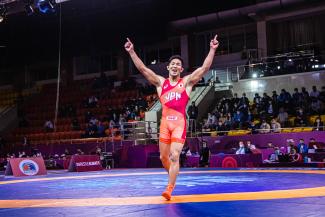
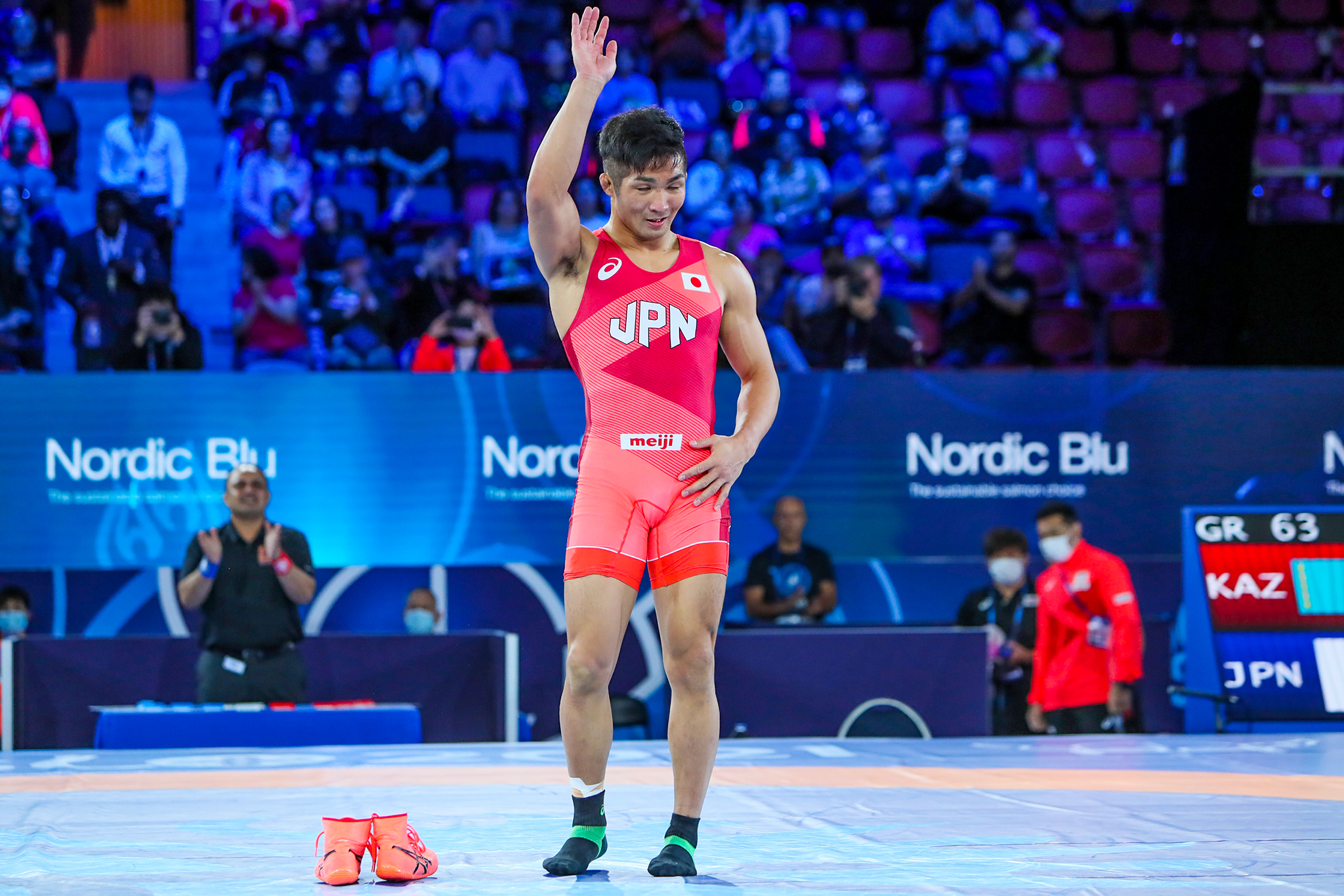 Tsuchika SHIMOYAMADA (AUS) had left his shoes on the mat during the 2021 World Championships to mark his retirement. (Photo: United World Wrestling / Martin Gabor)
Tsuchika SHIMOYAMADA (AUS) had left his shoes on the mat during the 2021 World Championships to mark his retirement. (Photo: United World Wrestling / Martin Gabor)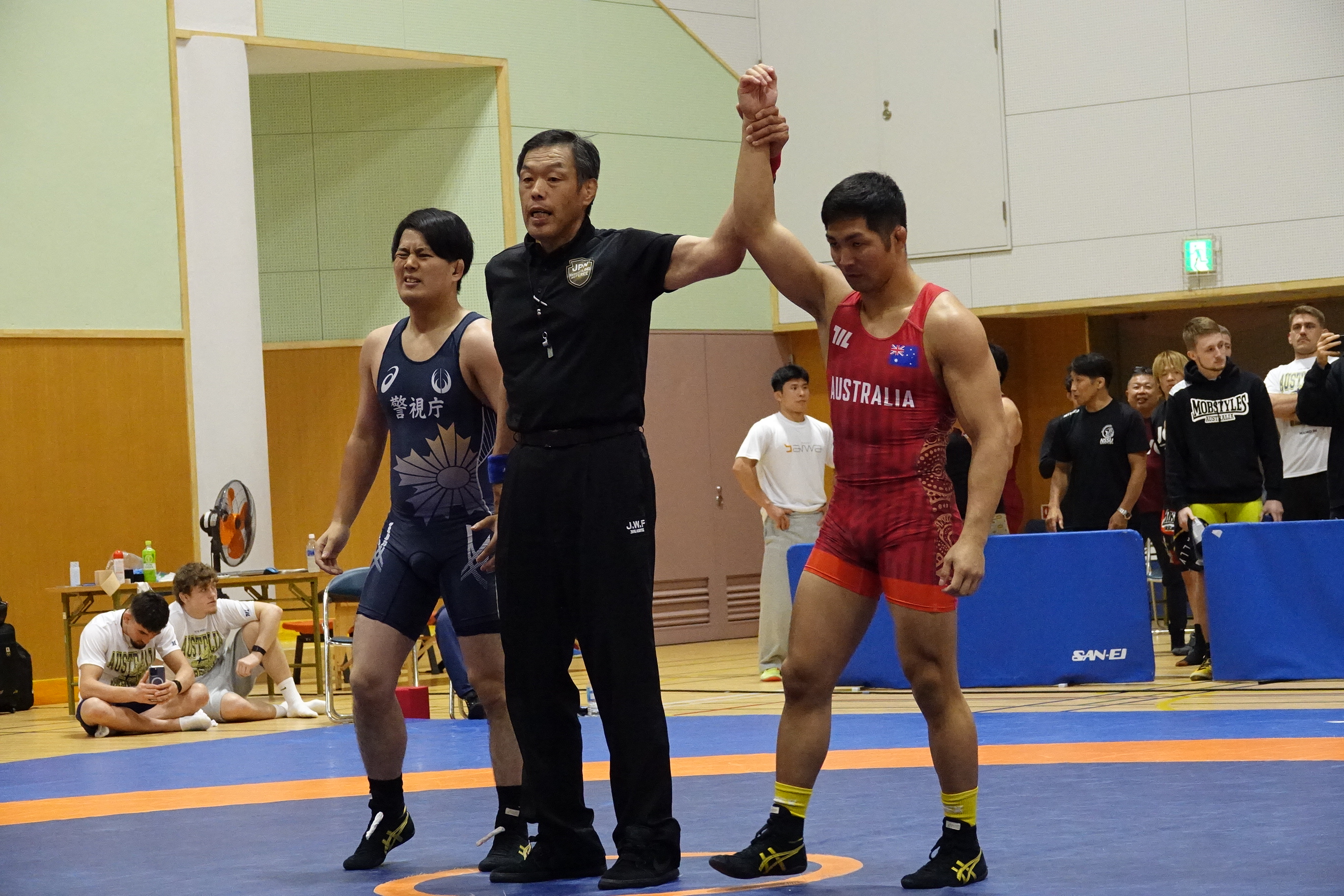 Tsuchika SHIMOYAMADA advances to the semifinals at the All-Japan Non-Student Championships in July with a 52-second win over Kokoro GOTO. (Photo: Koji Fuse / wrestling-spirits.jp)
Tsuchika SHIMOYAMADA advances to the semifinals at the All-Japan Non-Student Championships in July with a 52-second win over Kokoro GOTO. (Photo: Koji Fuse / wrestling-spirits.jp)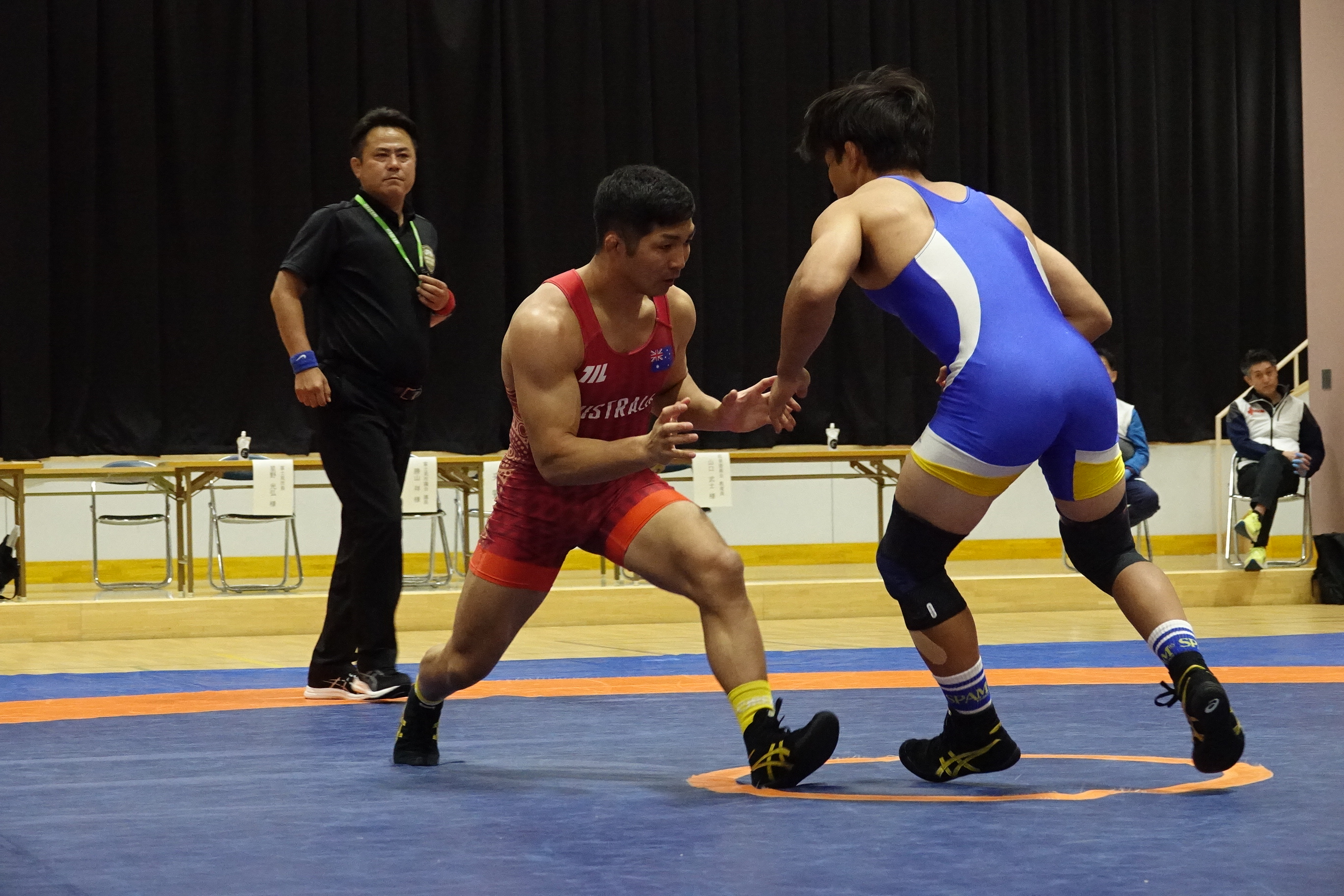 Tsuchika SHIMOYAMA faces Keitaro ONO in his opening match at the All-Japan Non-Student Championships in July. (Photo: Koji Fuse / wrestling-spirits.jp)
Tsuchika SHIMOYAMA faces Keitaro ONO in his opening match at the All-Japan Non-Student Championships in July. (Photo: Koji Fuse / wrestling-spirits.jp)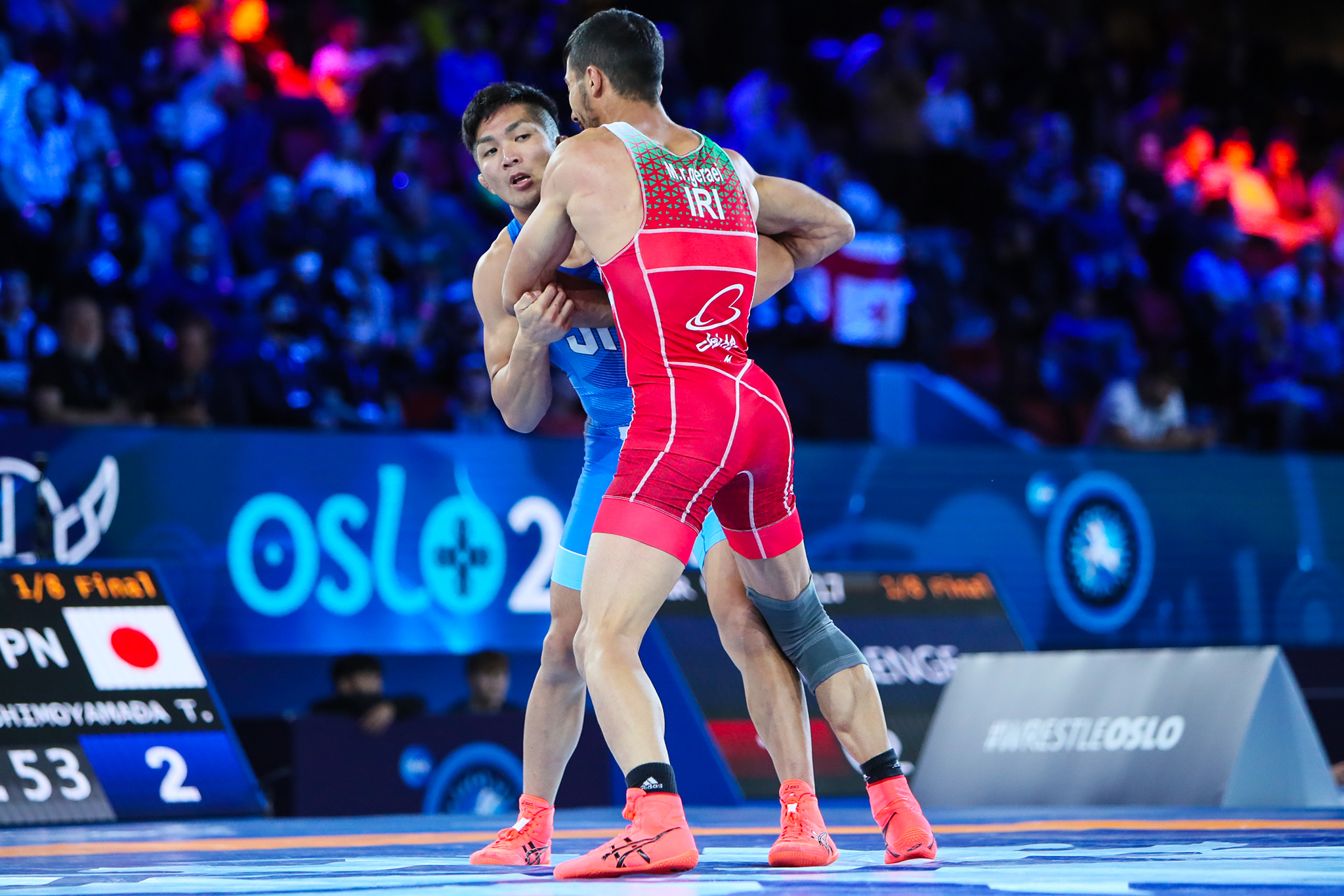 Tsuchika SHIMOYAMADA (AUS) was dominating Mohammadreza GERAEI (IRI) in their match at the 2021 World Championships before being pinned. (Photo: United World Wrestling / Martin Gabor)
Tsuchika SHIMOYAMADA (AUS) was dominating Mohammadreza GERAEI (IRI) in their match at the 2021 World Championships before being pinned. (Photo: United World Wrestling / Martin Gabor)
Share your thoughts.
Comments